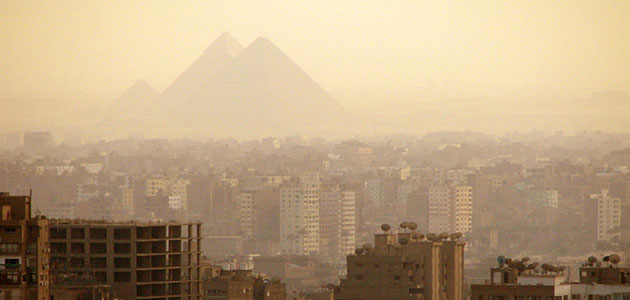 “There is corruption in local government,” admitted President Abdel Fattah el Sisi at a presidential youth forum in Cairo in early August. “But, what can we do?” he laughed.
“There is corruption in local government,” admitted President Abdel Fattah el Sisi at a presidential youth forum in Cairo in early August. “But, what can we do?” he laughed.
“Sack and jail Hisham Geneina” was one sarcastic suggestion on Twitter. Geneina was the head of Egypt’s top auditing body until earlier this year when he publicly said how much corruption was costing Egypt. For his honesty, which the president appears to agree with, he was sacked, sentenced to a year in prison and fined US$2,200 for ‘spreading false news’.
Corruption might be a laughing matter for President Sisi, but the joke is on Egyptians, rich and poor. Egypt’s economy is battling with a deep dollar crisis, the Egyptian pound is slumping, food prices are skyrocketing, and corruption remains a constant guest of the Egyptian state.
It is not true, as the Egyptian Prime Minister claimed, that corruption is getting better in Egypt, as proved by Egypt’s ranking on Transparency International’s annual Corruption Perceptions Index (CPI). Egypt appears to have climbed several places on the index over the past few years – though the prime minister actually misstated the numbers – but tellingly its score has remained low. (The actual rank of Egypt was 88 out of 168 countries in 2015, and in 2014 it ranked 94 out of 175.)
The prime minister put this improvement down to the National Anti-Corruption Strategy, which kicked off in December 2014. But a country’s ranking only indicates its position relative to other countries included in the index and each year that number can change. What gives a more accurate measurement of the perception of public sector corruption is the country’s score. Egypt scored 36 out of 100 in 2015, which places the country on the lower end of the index and indicates a significant problem with corruption.
This is corroborated by the World Bank’s Worldwide Governance Indicators for 2014, which gives Egypt a score of 32 out of 100 for fighting corruption. The status quo of Egypt’s level of corruption is far more disappointing than what the Prime Minister euphorically revealed a few weeks ago.
After Mubarak’s ouster in 2011, Egypt moved to clamp down on its endemic corruption, and adopted a relatively strong anti-corruption legal framework. But these laws remain unimplemented, simply ink on paper.
Not surprisingly, Egyptians take a dim view of their country’s efforts to fight corruption. Fifty-three per cent believe that the courts are corrupt while 43 per cent view the police the same, according to the latest survey from Transparency International. This will not be improved by the prosecution of Mr Geneina, a clear infringement on the independence of the Central Auditing Organization.
Fighting corruption is serious work. It requires political will, a committed and transparent government, an independent judiciary, free and strong civil society and empowered citizens. Most of these factors are still missing in Egypt, and making media splashes with incorrect numbers will not solve the problem.
Egyptian civil society heavily criticised the national strategy for making fighting corruption the sole job of the government. “It should have been called the governmental anti-corruption strategy instead,” one commentator said. And as the president admitted, with the high levels of corruption in Egypt, it obviously isn’t working.
Carousel image: Creative Commons, Flickr / axelrd















 Connect with us on Facebook
Connect with us on Facebook Follow us on Twitter
Follow us on Twitter